Kapsk04
On this page, you find all documents, package deals, and flashcards offered by seller kapsk04.
- 9
- 0
- 0
Community
- Followers
- Following
9 items
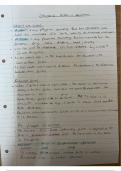
Notes on mechanics
Included in these notes are the key definitions (e.g. momentum, work done) as well as the differences between vectors and scalars, conditions for forces to be in equilibrium, and the principle of moments. The centre of mass for a body is also defined. The constant acceleration equations (suvat) are given and the motion of a body in free fall is explored. Furthermore, the rules and assumptions for projectile motion are also given. In addition all 3 of Newton's laws of motion are explained as we...
- Summary
- • 9 pages •
Included in these notes are the key definitions (e.g. momentum, work done) as well as the differences between vectors and scalars, conditions for forces to be in equilibrium, and the principle of moments. The centre of mass for a body is also defined. The constant acceleration equations (suvat) are given and the motion of a body in free fall is explored. Furthermore, the rules and assumptions for projectile motion are also given. In addition all 3 of Newton's laws of motion are explained as we...
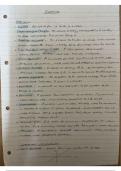
Notes on electricity
Included in these notes are the key definitions (e.g. emf, resistivity) as well as the explanations for how current voltage and resistance vary with each other in components such as diodes, filament lamps, and thermistors. A description of the resistivity is given as well as how temperature affects the resistance of a metal. The meaning of a superconductor is given as well as some of its uses. In addition, the rules and differences for calculating current, voltage, and resistance for series and ...
- Summary
- • 5 pages •
Included in these notes are the key definitions (e.g. emf, resistivity) as well as the explanations for how current voltage and resistance vary with each other in components such as diodes, filament lamps, and thermistors. A description of the resistivity is given as well as how temperature affects the resistance of a metal. The meaning of a superconductor is given as well as some of its uses. In addition, the rules and differences for calculating current, voltage, and resistance for series and ...
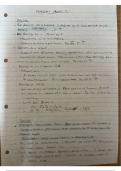
Notes on materials and further mechanics
Included in these notes are the key definitions (e.g. Young's modulus, damping) as well as the equations and explanations for how the density is measured in different states(e.g. regular solid, irregular solid, liquid). Hooke's law and the limit of proportionality are also defined as well as the transfer between elastic potential and kinetic in a spring. An explanation of tensile stress and strain and the equation linking these to Young's Modulus is also given. The difference between a britt...
- Summary
- • 9 pages •
Included in these notes are the key definitions (e.g. Young's modulus, damping) as well as the equations and explanations for how the density is measured in different states(e.g. regular solid, irregular solid, liquid). Hooke's law and the limit of proportionality are also defined as well as the transfer between elastic potential and kinetic in a spring. An explanation of tensile stress and strain and the equation linking these to Young's Modulus is also given. The difference between a britt...
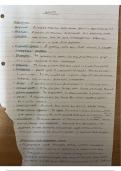
Notes on waves and optics
Included in these notes are the key definitions (e.g. Coherence, phase difference) as well as differences between progressive and stationary waves and longitudinal and transverse waves. There is also a detailed explanation of what it means for a wave to be polarised and some of its applications including polarised sunglasses and polarised TV and radio signals. In addition, there is a description of superposition including the difference between constructive and destructive interference. The expe...
- Summary
- • 8 pages •
Included in these notes are the key definitions (e.g. Coherence, phase difference) as well as differences between progressive and stationary waves and longitudinal and transverse waves. There is also a detailed explanation of what it means for a wave to be polarised and some of its applications including polarised sunglasses and polarised TV and radio signals. In addition, there is a description of superposition including the difference between constructive and destructive interference. The expe...
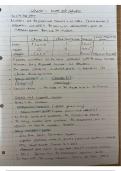
Notes on particles and photoelectric effect
Included in these notes are a summary of protons neutrons and electrons and a definition for the specific charge of a particle. There is also an explanation for how the different forces in the nucleus ensure that it remains stable and how if these forces were affected the nucleus may become unstable which leads to decay (alpha, beta, and gamma are all explained). There is also a detailed description of how light can exist in small packets known as photons. The difference between a particle and ...
- Summary
- • 12 pages •
Included in these notes are a summary of protons neutrons and electrons and a definition for the specific charge of a particle. There is also an explanation for how the different forces in the nucleus ensure that it remains stable and how if these forces were affected the nucleus may become unstable which leads to decay (alpha, beta, and gamma are all explained). There is also a detailed description of how light can exist in small packets known as photons. The difference between a particle and ...
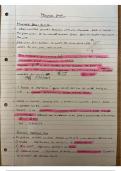
Notes on magnetic fields and EM induction
Included in these notes are the key definitions (e.g. back emf) as well as the equations and explanations for magnetic flux density. Both Fleming's left-hand rule and right-hand rules are explained. The motor effect and dynamo effect are compared as well as Maxwell's right hand rule. The properties that moving charged particles exhibit in magnetic fields are explored as well as some real-world applications of these such as cyclotrons and mass spectrometers. Magnetic flux linkage is also descr...
- Summary
- • 10 pages •
Included in these notes are the key definitions (e.g. back emf) as well as the equations and explanations for magnetic flux density. Both Fleming's left-hand rule and right-hand rules are explained. The motor effect and dynamo effect are compared as well as Maxwell's right hand rule. The properties that moving charged particles exhibit in magnetic fields are explored as well as some real-world applications of these such as cyclotrons and mass spectrometers. Magnetic flux linkage is also descr...
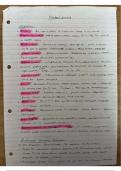
Notes on nuclear physics
Included in these notes are the key definitions (e.g. critical mass, mass defect) as well as the theory and experimental procedure of the Rutherford scattering experiment. The differences between alpha, beta, and gamma radiation are also stated along with their uses and how to distinguish between them experimentally. The inverse square law for gamma radiation was also proved. Furthermore, equations and theory behind radioactive decay are stated as well as how the forces in the nucleus help keep ...
- Summary
- • 8 pages •
Included in these notes are the key definitions (e.g. critical mass, mass defect) as well as the theory and experimental procedure of the Rutherford scattering experiment. The differences between alpha, beta, and gamma radiation are also stated along with their uses and how to distinguish between them experimentally. The inverse square law for gamma radiation was also proved. Furthermore, equations and theory behind radioactive decay are stated as well as how the forces in the nucleus help keep ...
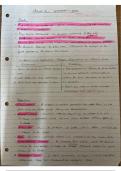
Detailed notes on Fields(Gravitational and Electric) and Capacitors
Gravitational fields Included in these notes are the key definitions (e.g. Gravitational potential, escape velocity) as well as the equations and explanations for Newton's Law of Gravitation, gravitational field strength(g) for different types of field(radial and uniform), and gravitational potential. There is also a detailed explanation of equipotential surfaces and escape velocity. The different types of uniform satellites (Geostationary, Geosynchronous) are also compared and their uses a...
- Summary
- • 14 pages •
Gravitational fields Included in these notes are the key definitions (e.g. Gravitational potential, escape velocity) as well as the equations and explanations for Newton's Law of Gravitation, gravitational field strength(g) for different types of field(radial and uniform), and gravitational potential. There is also a detailed explanation of equipotential surfaces and escape velocity. The different types of uniform satellites (Geostationary, Geosynchronous) are also compared and their uses a...
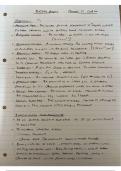
Detailed notes on thermal physics
Included in these notes are the key definitions (e.g. Absolute zero, ideal gas) as well as the equations and explanations for specific heat capacity, latent heat, and continuous flow heating. There is also a detailed explanation of how temperature is related to the internal energy of particles. The first law of thermodynamics is also explored. Furthermore, the ideal gas laws (Boyle's, Charles', and the pressure law) have all been explained fully as well as the ideal gas equation. Finally, the k...
- Summary
- • 6 pages •
Included in these notes are the key definitions (e.g. Absolute zero, ideal gas) as well as the equations and explanations for specific heat capacity, latent heat, and continuous flow heating. There is also a detailed explanation of how temperature is related to the internal energy of particles. The first law of thermodynamics is also explored. Furthermore, the ideal gas laws (Boyle's, Charles', and the pressure law) have all been explained fully as well as the ideal gas equation. Finally, the k...
